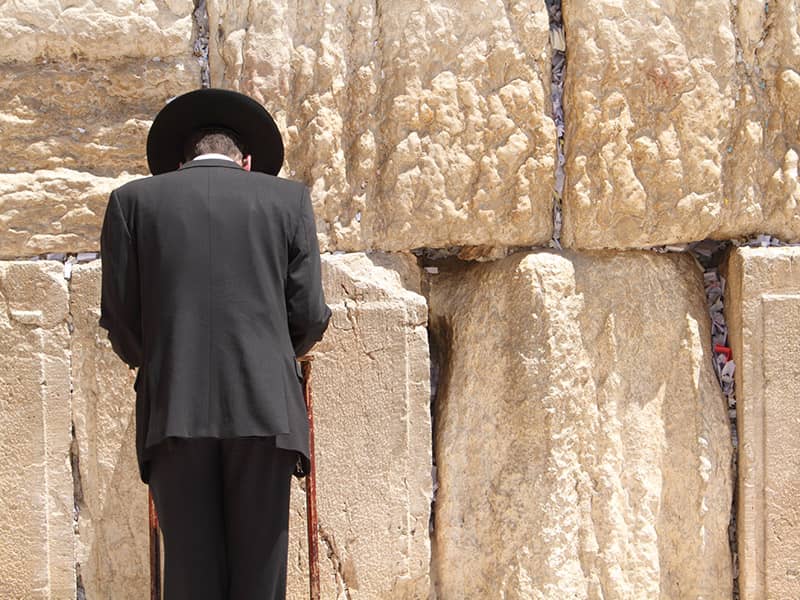Jewishness was my home, and God, sitting up in the sky, was my friend. Whenever I did anything wrong, I ran to the window and whispered, "Excuse me, God, excuse me, God, excuse me, God." He always excused me.
On Moore Street, I thought the whole world was Jewish. The Butcher, the grocer, the dressmaker, the corsetiere who made my mother's corsets--everyone was Jewish.
Every day I sat on the street curb, watching and listening. Shabbily dressed hawkers shouted in Yiddish accents: "Old clothes, buy old clothes." "Fix your knives." "Sharpen your tools."
"Gai schoyn [Move along]." Men sat high up on their wagons, flogging their tired dray horses. I was too small to roller-skate, but my sister, Betty, two years older, dared to clutch the back of a wagon and screamed with delight as she was pulled up the bustling street.
Moore Street smelled of pickles in big barrels, of roasted chestnuts and sweet potatoes, of jelly apples and knishes and haisse arbes [chick peas]. Each morning a man who looked like the giant in "Jack the Giant-killer," with sweat dampening his shirt, carried a huge mound of ice in iron claws from his ice wagon up the stairs to our flat over the liquor store that Papa owned. Then, looking down at me on the curb, he gave me a small chunk of ice to suck. "Take it, child," the giant said in Yiddish, and with his giant hands he patted me gently on the head.
On Saturday, the seventh day, Moore Street rested. The horses and carts did not clomp down the streets; the vendors stayed home; the iceman did not come. Only a few stores were open.
Before dusk, Betty and I walked home, carrying bags of rogalech. I felt snug and safe in this small, all-encompassing Jewish world.
My Jewish world began enlarging when I entered P.S. 141, a girls' public school. Most of the teachers were young, second-generation Irish women. Teaching was their step up the American ladder, as being a priest or a cop or a politician was the route many of their brothers took. Black women were still on the bottom rung of the ladder. My first-grade teacher was an exception--a strikingly beautiful young black woman who taught our class of Jewish, Irish, Polish, and a few black girls to read and memorize poetry and to cherish books.
On a late spring afternoon I caught sight of her entering our flat over the store. Once again I hid behind the bedroom door as she climbed the stairs.
Mama answered the knock. "Yes?" she asked hesitantly.
I could hardly breathe.
"I am Ruth's teacher," she said.
"Her teacher!" Mama's voice trembled. "Did she do something wrong?"
"No, no. I just wanted to tell you to take good care of her. She loves books so much I'm sure that some day she's going to be a writer."
So she knows, I thought.
Early Saturday morning, Zayda Gruber came to the house to take me with him to shul. "Of all his 14 grandchildren," Mama told me later, "you were his favorite, almost from the day you were born. I would put you out in the carriage to get fresh air, and he could come into the store, mad like anything. He would wave his finger at me like this." Mama shook her finger angrily. "He would yell at me, 'Nemm ihr arein [Take her inside]. She slept out there long enough. You don't take enough care of her.'"
For Mama and Papa, Saturday was no day of rest. They locked the liquor store only on the High Holidays--Rosh Hashanah and Yom Kippur--and on the first day of Passover, when the whole family marched proudly to the synagogue. Papa, wrapped in his huge white prayer shawl, sat downstairs with the boys, while Mama, Betty, and I sat upstairs with the women. I sat solemnly, angry if the women chattered. I wished I were down in the big hall with Zayda, praying and swaying and singing in Hebrew, not one word of which I understood.
At lunchtime Mama served a big Shabbos meal of gefilte fish, chicken soup, boiled chicken, and applesauce. Then Betty and I walked the six blocks to visit Mama's parents, Baba and Zayda Rockower. They lived over their beer parlor in a corner house that stretched around Bushwick Avenue and Varet Street. Baba, taller than Mama, carried herself erect, always tightly corseted and elegant even in her housedress. Zayda, an engineer in Russia, portly, with a black sweeping mustache, had organized the David Rockower B'nai B'rith Lodge, which met in the meeting hall in their home. Seated on a throne, he presided over boisterous political meetings and pinochle games.
Betty and I were barely inside the kitchen when Baba Rockower made us sit at her round table and eat our favorite rogalech, little rolled cakes filled with raisins and nuts. Then, satisfied hat we really couldn't put another morsel in our mouths, she said, "Now we got to the lunge." The lunge was a brown leather lounge in the parlor, where she took her daily nap. She handed me her steel hairbrush, stretched out on the couch, and while I stroked and brushed her long chestnut hair, she told us stories of her childhood in Russia.
She had come to America in her twenties and, needing to work, had never found time to go to night school to learn English properly. Her favorite advice to Betty and me was "You be good girls. You no talkit mit de boys. You kiss a boy, you get a baby."

